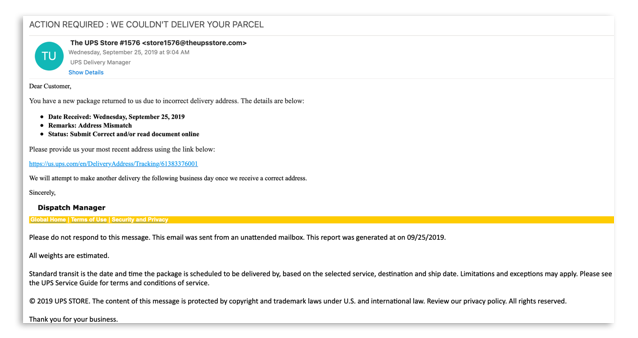The Devil Sells Prada(-ish): How to Spot Shopping and Shipping Scams
It’s always online-shopping season in America. From Amazon Prime Day and back to school sales to Cyber Monday, the deals just keep rolling in. But online shopping sites can be home to fake deals, so buyer beware!
In 2018, the U.S. Government Accountability Office found that two out of every five products purchased online were counterfeit. Getting ripped off is bad enough, but fake products can be harmful to your health. A Business Insider story cited studies showing counterfeit products can contain harmful substances, from cyanide to rat droppings. One buyer even reported getting counterfeit car brake pads that failed within one month. Such a deal! And if the fake products don’t get you, fake shipping emails can.
Here are some expert tips to help you avoid an undesirable online shopping experience:
- Read product descriptions carefully, looking for grammar or spelling errors or even punctuation errors such as no spaces after commas. Any of these red flags can indicate that the seller is operating outside the U.S.
- Check the seller and shipper information. Confirm that the product both ships from and is sold by Amazon, Walmart, or whatever online retailer you’re buying from.
- Look at the product on other legitimate online retail sites. A real product will show up in multiple retail locations, and the price will be roughly comparable.
- As always, be wary of a deal that’s too good to be true. Real Prada bags and Jimmy Choo shoes don’t sell at knock-off prices.
But the work doesn’t stop here. After you make it past our tips and you’ve ordered your product, you now have to be on the lookout for package delivery scams. These can include “representatives” looking to get your personal information. Many times, these will come in the form of a phishing email, made to look like it’s coming from a shipping company. Be wary of any “package tracking” links that can download malware to your computer or direct you to a website designed to steal personal information. Below is an example of a very credible looking phishing email:

Appearing to come from a reputable shipping company, (UPS) it looks to be a legitimate shipping notification. At first glance, you wouldn’t think anything “phishy” was going on here, but after a closer review, you will notice that it doesn’t give a delivery address, shipper’s name, or even the recipient’s name. Also, if you were to hover over the link, you’d find that it goes to OneDrive.com, Microsoft’s online filesharing service. Hackers now use filesharing sites such as OneDrive and Google Drive to deliver malware. Any of these email red flags should cause you to hesitate.
Let’s face it, we can all use a little retail therapy now and again but getting conned into a “must-have” deal can really spoil things. Practicing safe online shopping helps avoid these risks. Watch for the telltale signs of counterfeit products, and if you get an unexpected email about a package delivery that you’re not sure about, contact the shipper directly. No matter how much you want that awesome deal or a package delivered right away, it’s better to stop and think before you click “Buy now”.
About IDX
We're your proven partner in digital privacy protection with our evolving suite of privacy and identity products.




